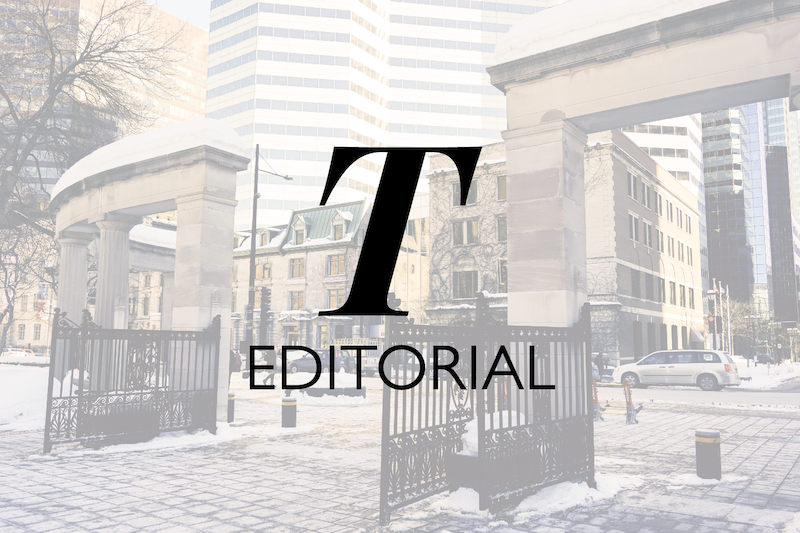Thousands of students returned to the classroom on Sept. 1, 2021. For the first time in almost two years, lecture halls were packed, podiums were filled, and at last, friends from all over the world were reunited. But as welcome as these nostalgic campus scenes are, McGill’s current safety guidelines are terribly inadequate. From failing to provide remote course options for people who cannot be, or do not wish to be, on campus, to embarrassing itself with an underprepared vaccine registration program, administrative shortcomings are generating learning inequities and steering the university on a path toward further outbreaks. McGill must push for government vaccine requirements, institute hybrid learning, and correct other accessibility issues before its reopening becomes its next unbearable shuttering.
Although Quebec law may prevent universities from instating a vaccine requirement the way many universities in Ontario and the United States have, the administration can still take a definitive stance on it. Many of McGill’s own experts have argued that a vaccine mandate would not only be legally permissible but also ethically and medically expedient. Moreover, with the rise of the COVID-19 Delta variant—which numerous researchers believe can infect and spread through vaccinated individuals as easily as those who are not—many are reluctant to return to campus due to legitimate safety concerns. Administrators are doing McGill’s scholars a profound disservice: By disregarding their professional opinions, the university is effectively reducing professors’ relationship with the university to one that is merely transactional, rather than one that is built on respect and academic accomplishment.
It would be unreasonable to demand that McGill violate Quebec law, even though some lawyers do not think implementing a vaccine mandate would do so. But there is nothing stopping McGill from issuing a statement standing with its scholars, advocating for emergency legislation, and committing to leadership in accessibility moving forward. Importantly, the institution does not need to wait for the government to do everything. It should offer a hybrid model for instruction with remote options for students who either cannot enter Canada or who do not feel comfortable being in person. At the very least, it would be prudent to persuade instructors to record their lectures, as well as to prohibit mandatory attendance rules—which some professors have applied despite the precarious public health situation. Recordings would also serve students experiencing COVID-19-like symptoms by relieving the pressure to attend class when they are feeling unwell.
International students have also been ignored in McGill’s calculus. To be able to apply for Canadian residency, foreigners need to spend a certain number of years in the country. Even if they are enrolled in a Canadian educational institution, they must be physically present, and time spent at university sometimes only counts for half of the required time. By allowing an unsafe environment to fester, administrators are forcing international students to choose between their health and their immigration eligibility. Such a situation is morally wrong and professionally unethical, not least considering that students—international students more than anyone—keep McGill alive with their tuition dollars.
Still, students are responsible for following public health measures, adhering to McGill’s mask-wearing requirements, and getting vaccinated despite it not being mandatory for essential activities. Although it is right to criticize McGill for inequitable policies that force people to be on campus while it remains an unsafe, infeasible, and inaccessible space for many, student organizations must lead by example and enforce stringent safety protocols at their events.
The rejuvenation of friendships, the revival of frosh, and the resumption of in-person instruction are all long-awaited experiences to be grateful for. But the pandemic is not over yet. For the sake of the social stability that Quebec has fought hard to achieve and maintain, it is imperative that everyone continue to take infection prevention seriously and encourage others to do the same. Together, the McGill community must create a culture of collective accountability to seal the holes in McGill’s rickety policy framework.









Excellent editorial! You went straight for the jugular of a university’s prehistoric practice of wait and see rule of governance! This school is supposed to be a leader among schools in Canada and right it now seems to be bringing up the rear. Check mate!
I agree. At a minimum lectures should be recorded and available to students who may not be able to be physically present. We are in a pandemic and do not want students with symptoms to be attending lectures for fear of missing out on material while potentially infecting others. Required Vaccination is also key in getting us back in track.
Why not do in person classes with masks for the fully vaxed, and “best effort” virtual classes for the unvaxed? That way no one would be denied an education, but responsible behavior would be rewarded.
Maybe the title should read, “Reopen Completely, or Close Permanently” The rest of the world is opening in spite of COVID. Not all universities in the US are requiring vaccination as there are some very serious personal liberty questions circulating around any requirement to force citizens to undergo a medical procedure. McGill must learn to live with this disease just like the rest of the world. If you want to protect yourself, get vaccinated. End of conversation.